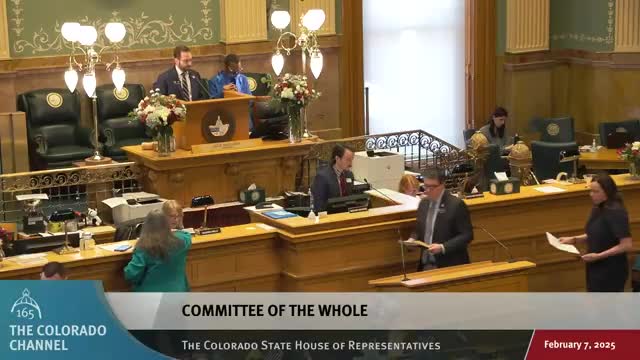House OKs bill requiring transparent, evidence-based standards for behavioral-health coverage
Get AI-powered insights, summaries, and transcripts
Subscribe
Summary
Lawmakers passed HB1002 after committee and floor amendments that require insurers to base behavioral‑health coverage determinations on transparent, nonprofit clinical standards and give the Division of Insurance rule authority to implement compliance measures.
The Colorado House passed House Bill 10-02 after floor amendments requiring clearer definitions and giving the state Division of Insurance authority to enforce compliance. Sponsors said the bill aims to increase transparency in how insurers make medical-necessity decisions for behavioral-health services and to reduce denials that block access to care.
Rep. Morgan Gilchrist, a co-sponsor, framed the bill as a response to long waits and out-of-network costs for families seeking mental-health care, saying, “I have experienced the difficulty and frustration of trying to navigate the mental health care system to get my own children the services they need.” Rep. Meg Brown, the other prime sponsor, told members the bill does not itself expand the benefits that must be covered under Colorado’s essential health benefits benchmark; instead it requires carriers to apply standards that are transparent and evidence-based when they make coverage determinations.
On the floor the House adopted several sponsor amendments. Amendment L012 clarified that the bill does not expand the state essential health benefits benchmark. Amendment L014 gave the Division of Insurance authority to adopt necessary rules to implement the bill. Sponsors also offered L008 and L013 (both adopted) to refine evidentiary criteria and define the nonprofit clinical standards insurers may use.
Supporters said HB1002 addresses the combination of limited provider availability and insurance denials that can leave patients without affordable, in-network options. Representative Johnston, a co-sponsor, said the measure is intended to ensure that families who pay premiums can access care and receive transparent explanations when care is denied. Rural lawmakers, including Representative Baron and Assistant Minority Leader Winter, described access barriers in their districts and urged passage to reduce denials that leave residents with no alternatives.
Opponents raised governance and scope concerns. Representative Bridal cautioned against legislative involvement in private insurer–provider contract disputes and said some issues may be better addressed through the Attorney General’s office or the Division of Insurance.
The transcript records the House adopting the bill as amended by voice/electronic vote; the roll call was recorded as “The ayes have it” (numeric tally not specified in the provided transcript). Sponsors said the bill will allow insurers to deny care under existing contract law but requires those denials to be based on standards developed by nonprofit clinical organizations and to be traceable and reasoned.
Supporters said the bill is meant to reduce administrative burden on providers and to give families a clearer path when appealing denials. The bill now moves to the next steps for engrossment and enrollment under the House calendar process.
